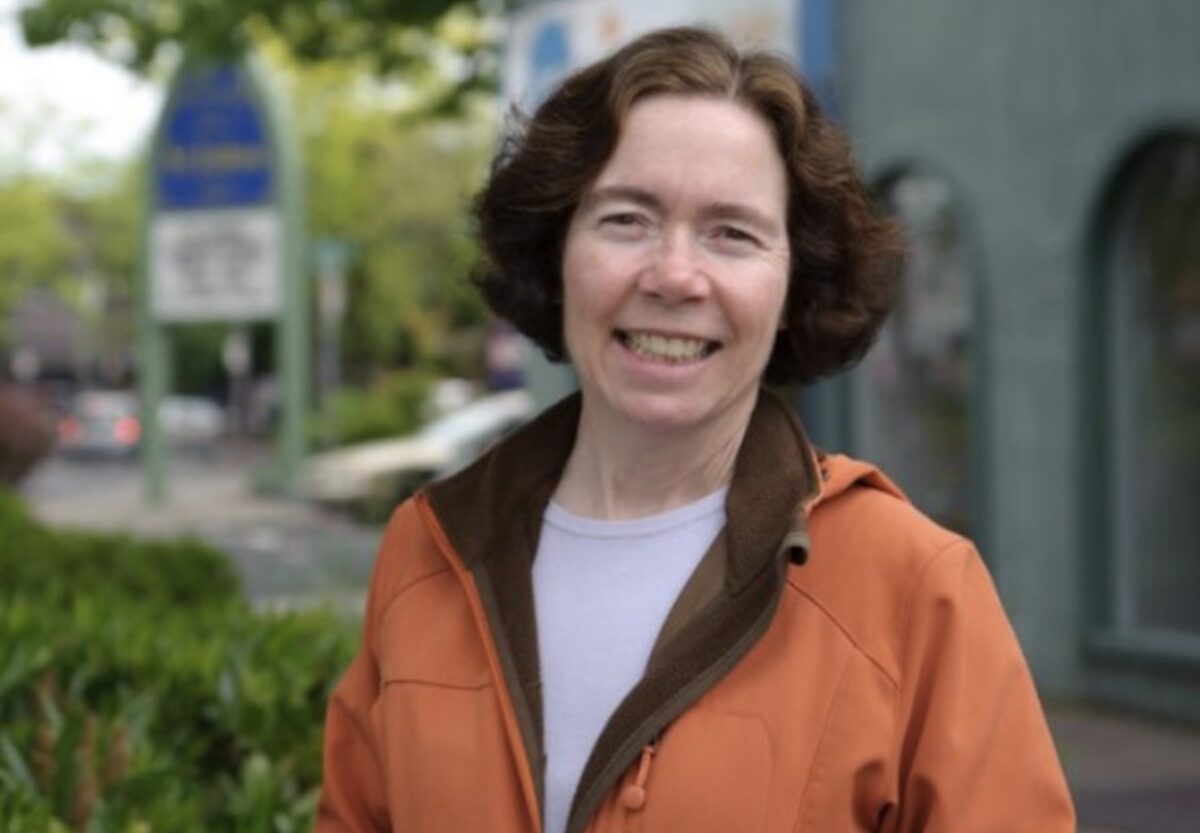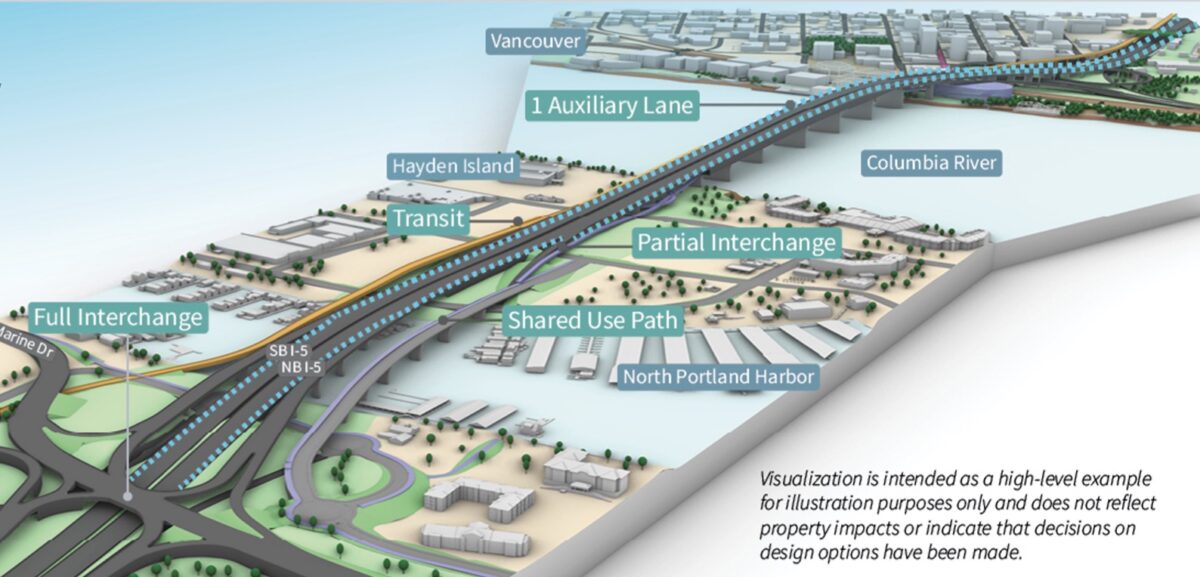Following a unanimous vote at the Portland City Council in favor of the current plan for the Interstate Bridge Replacement, the Oregon Metro Council voted 6 to 1 to do the same Thursday, with only staunch project critic Mary Nolan in dissent. The vote signals the incredible momentum that this $4-5 billion megaproject has as it heads into its environmental review phase.
The Locally Preferred Alternative (LPA) for the project includes four travel lanes in each direction, including one new “auxiliary” lane, as well as light rail following I-5 into Vancouver.
“Today I will be voting on behalf of BIPOC individuals in communities that I represent who deserve environmental justice in all the decisions that we make, particularly in infrastructure investments as profound and as expensive as this one,” Nolan said ahead of their vote. “Perhaps most importantly, I will be voting on behalf of the young activists who we’ve heard from in the mail and who we heard from today in person…they are pleading with us to leave them with a region and a planet that they can live in, and so I’ll be voting no.”

“I will be voting on behalf of the young activists who we’ve heard from in the mail and who we heard from today in person…they are pleading with us to leave them with a region and a planet that they can live in, and so I’ll be voting no.”
– Mary Nolan, Metro councilor
But Nolan’s other potential anti-highway allies on the council suggested that voting “yes” for the LPA was the best way to ensure that the project meets the values that the Metro council is advocating for.
“… compromise is paramount.”
– Juan Carlos Gonzalez, Metro
Juan Carlos Gonzalez, who has been outspoken on the issue of expanding highways in the past, said that the current version of the LPA is the best chance of making a new I-5 between Washington and Oregon a reality. “With this project’s scope and the fact that we’re working with all these partners, compromise is paramount,” he said. Gonzalez joins Portland Commissioner Jo Ann Hardesty as highway-skeptical voices who are framing their embrace of the project as an act that makes it better.
“This decision transforms how we do business by introducing variable rate tolling to influence demand and therefore GHG. The first time Oregon has ever implemented such a policy tool. We are also building Light Rail to provide new high capacity transit to support mode shift,” Gonzalez tweeted in response to criticism from Sunrise PDX following his vote.
Duncan Hwang, who joined the council in January, said he was deferring to the work that his colleagues had done on the bridge in deciding his vote. “While this bridge may not be the bridge that Portland would have built, or that I would have built, an organizing principle I bring to the work is that we live in a world as it is and not as we want it to be,” he said.
But Mary Nolan was the only council member to raise the issue of massive cost overruns that are popping up on other large transportation projects around the region. “ODOT has announced over a billion dollars in cost overruns on projects just within our region. This cannot do anything except add tremendous pressure on the ability of this region to invest in transportation improvements for safety and environmental justice that I think we all need,” Nolan said.
Before the vote to approve the LPA, the Metro Council voted to adopt a set of non-binding “conditions of approval”. New on that list is a demand to create a baseline level of Vehicle Miles Traveled (VMT) and Greenhouse Gas (GHG) emissions and to demonstrate how the project can produce a reduction in both that aligns with the State of Oregon’s climate goals. But several councilors noted how little force and effect this could actually have. “ It’s nice, and it makes us feel good,” Councilor Gerritt Rosenthal said, but that’s about it.
A majority of comments heard before the vote requested a “no” vote, including representatives from Sierra Club Oregon Chapter and the Oregon Environmental Council.
The coalition of orgs seeking to push the project in a positive direction, the Just Crossing Alliance, framed the nearly-unanimous vote as a big setback. “This is a missed opportunity for the region to make good on its climate goals, and hold the IBR team accountable for their lack of transparency and inability to provide decision makers with a viable financial plan or an analysis of the environmental impacts.” said Anna Kahler on behalf of the JCA.
“The IBR project team is repeating the mistakes of the CRC, dooming our region to an unjust, unsustainable and fiscally irresponsible massive bridge project. It is imperative that representatives hold ODOT and the IBR project team accountable to their promises. If the IBR project team and the DOTs refuse to learn from the blunders of the past, our local and state governments must,” she said.
Also among those urging “no” was State Representative Khanh Pham, who told the council that an IBR that isn’t “right sized” means one that is taking away resources from other desperately needed transportation investments. “We need to use the same creativity that our region used when we challenged the Mount Hood Freeway,” Pham said. She wanted the council to hold off approving the project until an investment grade analysis is conducted, something the Just Crossing Alliance is also pushing for.
Pham doesn’t serve on the bi-state legislative committee that will vote to approve the LPA next Thursday. If any “no” votes emerge then, they will likely come from legislators in southwest Washington who are unhappy that there aren’t more added lanes included in the LPA. But now the Locally Preferred Alternative has the seal of approval of Portland, Vancouver (which voted to approve the LPA on Monday), and Metro, so those lawmakers now have much weaker footing to push back on this so-called compromise option.



